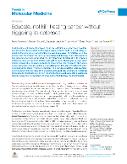Educate, not kill: treating cancer without triggering its defenses

Author
Bizzarri, Mariano
Publication date
2024Published in
Trends in Molecular MedicineVolume / Issue
30 (7)ISBN / ISSN
ISSN: 1471-4914ISBN / ISSN
eISSN: 1471-499XMetadata
Show full item recordCollections
This publication has a published version with DOI 10.1016/j.molmed.2024.04.003
Abstract
Traditionally, anticancer therapies focus on restraining uncontrolled proliferation. However, these cytotoxic therapies expose cancer cells to direct killing, instigating the process of natural selection favoring survival of resistant cells that become the foundation for tumor progression and therapy failure. Recognizing this phenomenon has prompted the development of alternative therapeutic strategies. Here we propose strategies targeting cancer hallmarks beyond proliferation, aiming at re-educating cancer cells towards a less malignant phenotype. These strategies include controlling cell dormancy, transdifferentiation therapy, normalizing the cancer microenvironment, and using migrastatic therapy. Adaptive resistance to these educative strategies does not confer a direct proliferative advantage to resistant cells, as non-resistant cells are not subject to eradication, thereby delaying or preventing the development of therapy-resistant tumors.
Keywords
anticancer therapies, cytotoxic therapies, resistant cells, tumor progression, therapy failure, migrastatic therapy
Permanent link
https://hdl.handle.net/20.500.14178/2600License
Full text of this result is licensed under: Creative Commons Uveďte původ-Neužívejte dílo komerčně 4.0 International







